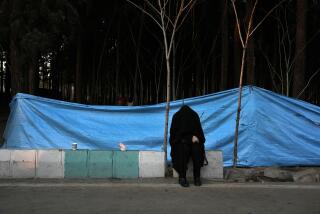Editorial: The Manchester bombing and Trump’s dubious Middle Eastern strategy
The sight of thousands of teenagers, mostly girls, fleeing in panic from the blood and smoke of a concert hall in the northern English city of Manchester may have warmed the hearts of Islamic State commanders, who tweeted victoriously that the “crusaders” — i.e., the girls — had been targeted by a “soldier of the caliphate.”
But to most of the world, Monday’s attack served as further evidence, where none was needed, of the organization’s utter depravity. For President Trump, that evidence arrived at an opportune moment, coming as he crossed the Middle East from Riyadh to Jerusalem calling for a new crackdown on Islamic radicalism and extremism.
And Trump is right, as far as that goes. Islamic State desperately needs to be stopped. Manchester, of course, was only the most recent in a long list of vicious and appalling attacks inspired or directed by the organization: the Bataclan shootings in Paris, the Quetta killings in Pakistan, the Bastille Day truck massacre in Nice, the Orlando nightclub shootings, the Palm Sunday bombings in Egypt, to name just a few.
As for the worldwide caliphate that Islamic State likes to boast about, one needs only read Patrick McDonnell’s moving article about the Syrian city of Palmyra in these pages this week to have a sense of what life would be like there. Unsurprisingly, a year of Islamic State occupation in Palmyra was characterized by fatal stonings, repression of women, destruction and desecration of ancient monuments and public beheadings.
But condemning Islamic State is easy. More difficult is figuring out how to fight it. Trump’s view, as laid out during his Middle East visit, is that the Sunni Arab states must come together, make common cause with Israel over their mutual hostility toward Iran, allow that shared interest to help catalyze a Palestinian-Israeli peace deal and then move on to rid the world of violent extremists.
But making Iran the enemy — a strategic turnaround from the Obama years — is not necessarily a great idea, especially when the Islamic Republic has just reelected a relatively moderate president, when it has signed on to a nuclear deal which, while far from perfect, is widely seen as a significant step forward, and when it is actively involved in fighting Islamic State in Syria and Iraq.
For their part, the Sunni states of the Persian Gulf — Trump’s new best friends — are not exactly delightful company either. Saudi Arabia, for instance, is a repressive and undemocratic country and is waging a troubling, brutal war against the Houthis in Yemen. It is hardly a natural ally for the United States.
Middle East diplomacy, like healthcare and other issues which may seem simple from the hustings, is actually quite complicated. In the ruins of Palmyra, in the century-long hostility between Israel and the Palestinians, in the ongoing mistreatment of women, in the dogged militancy and fundamentalism of certain elements of Islam, the Middle East has proved itself complex terrain for American leaders. The usual Trump soundbites, simplistic policies and hollow phrases won’t suffice to defeat our antagonists there — or bring them to the table.
Follow the Opinion section on Twitter @latimesopinion and Facebook
More to Read
A cure for the common opinion
Get thought-provoking perspectives with our weekly newsletter.
You may occasionally receive promotional content from the Los Angeles Times.






